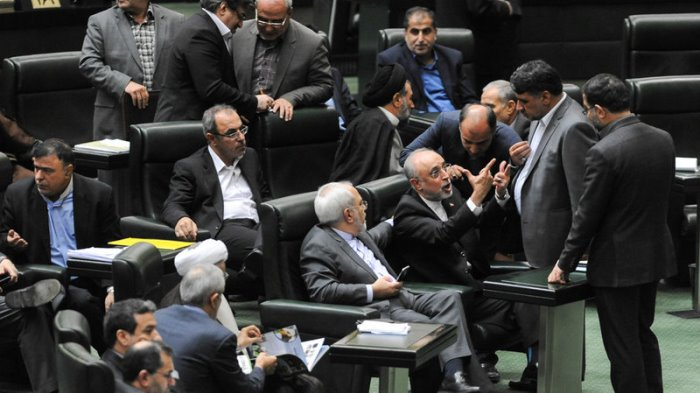How Does Majles Deal with the Deal?

Sunday October 11 was a memorable day for the Iranian parliament, Majles, from the unprecedented remarks of anti-deal MPs to the reaction of the Head of the Atomic Energy Organization Ali-Akbar Salehi. Iranian Diplomacy has interviewed Seyyed Hadi Hosseini, a proponent of the JCPOA on the issue:
IRD: The parliament gave its initial nod to the draft on JCPOA outlines on Sunday. One significant point is the number of negative votes. Couldn’t this be a challenge when it comes to ratifying the details?
SHH: The more important part was passing the outline of the JCPOA. That means the parliament has given approval to the JCPOA in its totality. There are however about 100 suggestions for amendment of the draft that we will take into consideration and make necessary changes if necessary.
IRD: One-hundred negative votes is a considerable number. How would the proponents of the JCPOA deal with opponents to the deal?
SHH: Of course it is a significant number. Even one vote counts. But when a draft turns into a law, everyone should comply. The majority has voted in favor of the draft bill, so we will not waste our time on the number of positive and negative votes afterwards.
IRD: The representatives’ right to object is sanctioned by the law. But there is also the issue of the quality of objection. How did you evaluate the representatives’ conduct in this regard?
SHH: I think what happened yesterday [strong objections against the JCPOA and the negotiators] stemmed from two types of concern. On the one hand, there are those who believe that the country’s national interests will be compromised if we approve the JCPOA; and on the other hand, the second group thinks the opposite. Tensions like what we saw on Sunday naturally occur over sensitive issues. I think that’s the beauty of it. Of course there were undesirable quarrels that I hope we don’t see again. But personally I appreciate the sense of responsibility of the representatives.
IRD: What we saw seems to be rooted more in political motives rather than legal concerns.
SHH: I don’t think it is all political. I think economic, political and social concerns were involved. The JCPOA has multiple dimensions. It is not correct to say that the parliament looked at it merely from a political angle. Several committees have examined the JCPOA and the Special Committee on the JCPOA was also engaged in the entire process. But the media prefer to highlight the political dimensions. We have held several sessions on the economic ramifications of the JCPOA.
IRD: How do you see the whole story as an advocate of the JCPOA?
SHH: I made strong efforts for its approval. Iranian society was waiting for this so some major obstacles are removed. Of course, many obstacles may not be actually overcome, but the common perception in the society in case of rejecting the deal would be that the government did its best to solve the problem, but the parliament and the establishment refused to do so.
My personal opinion is that the JCPOA’s impact should not be overblown. The deal cannot solve all our social and economic problems. The JCPOA is a step towards reconnecting to the outside world. Even if we want to have contacts with the US, we should be extremely vigilant, because they tend to be deceptive. However, one view holds that the nuclear agreement can return calm to the society and help the resumption of relations with those countries that were not hostile towards us, yet scaled downed relations in fear of the Americans.
IRD: How serious is the parliament in reacting to Congress’ decisions? Does it even have that attitude?
SHH: That is not true. Majles looks at the issue in a totally different manner. Although the Majles and Congress keep an eye on each other, but they don’t take the other side’s measures as the basis of their own actions. We are watchful towards what the enemy does, but we decide according to our national interests.
IRD: Some measures by the parliament, for example the report released by the JCPOA Special Committee, can create challenges for Iran’s foreign policy in terms of its commitments regarding the JCPOA.
SHH: That is possible. But what counts is the deal between Iran and the P5+1, not what this report says.

